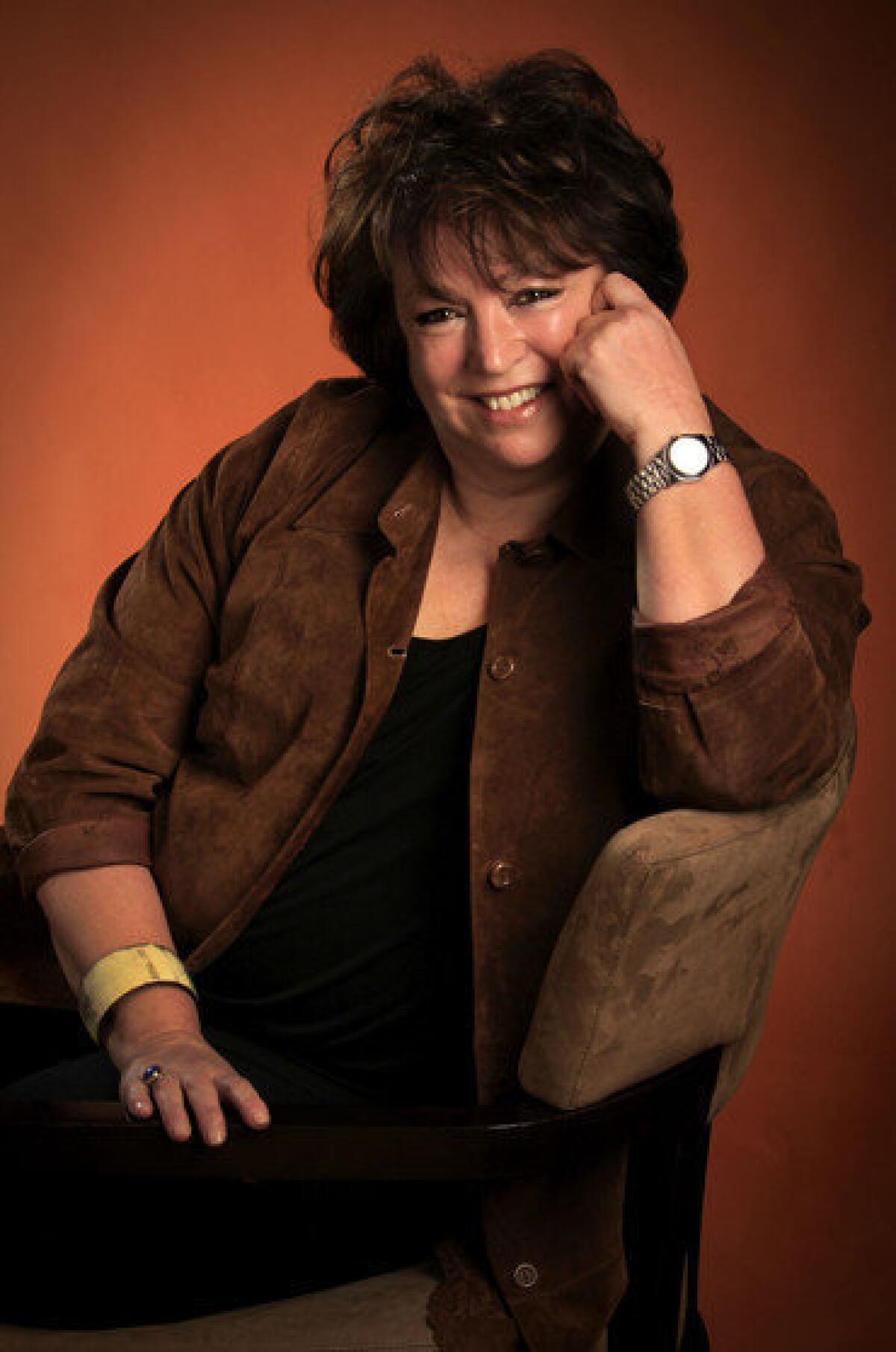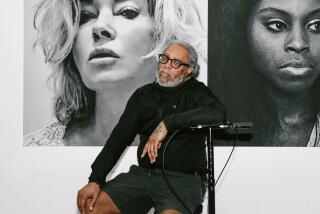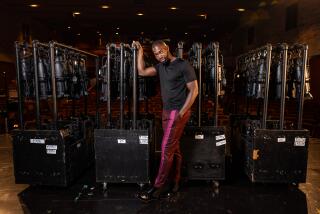The Sunday Conversation: Susan Lacy examines David Geffen on ‘American Masters’

Susan Lacy, creator and executive producer of PBS’ “American Masters” series, gives viewers a rare look at pop culture impresario David Geffen in her documentary “Inventing David Geffen,” which premieres Tuesday.
As the creator and executive producer of “American Masters,” why did you choose to make the David Geffen doc? Because you don’t make all of them.
This is probably the eighth film I’ve directed. I do have final cut on all our films. After about 10 years of doing the series, I’d spent so much time in edit rooms, I said, finally just do one on your own. And I’m very interested in music. Most of my films have been music subjects, whether it’s Paul Simon or Leonard Bernstein.... I’d gotten to know who David Geffen was because I’d interviewed him for a Joni Mitchell film. I thought he was a very interesting, mysterious kind of guy who was involved with all the music that had been the music of my time, the ‘70s, whether it was Joni or Neil [Young] or Crosby Stills & Nash.
Then I found out he also had been the guy behind Laura Nyro, and Laura Nyro is to me one of the greatest songwriters who ever lived. And that really made me interested in him, and I thought there’s really a good ear here. I’ve always been really interested in that confluence of people, events, times, social movements and how a cultural revolution is made. So David struck me as somebody in that mode. He’s really a huge factor in pop culture of the last 50 years.
How difficult was it to get his cooperation?
It wasn’t terribly difficult. I knew that he was a fan of the series, so I thought he might be receptive and he was receptive. The second part of that was that he didn’t realize that he actually had to sit for interviews. He said, “You didn’t have Leonard Bernstein, and you made a great film about Leonard Bernstein.”
Bernstein had a better excuse.
Exactly. Also, if he’d been alive, I wouldn’t have done it without interviews of him. And I had 1,000 hours of him on film. There’s very little film of David, almost none.
Why is that? Because he’s a behind-the-scenes guy?
And he really doesn’t like doing this. He’s, I think on some level, basically shy and doesn’t like to talk about himself. He’s not like a lot of people would think. He’s actually very genuine, I think. And he’s very straightforward and very direct, and I don’t think he spends a lot of time reflecting on the past.
How else did he surprise you?
I was surprised that somebody who had been in analysis five days a week didn’t like to talk about himself. I did feel I got to know him in making this film, and I like him a lot. I didn’t dislike him at the beginning, but I didn’t know I would come to like him so much.
How long did it take to make this?
It was a long process. During a period of four years, I was doing interviews [off and on] whenever I could. It turned out it was a really good thing that I could do that. Because the people I really wanted took two years to schedule. It took a long time to get Neil Young, for example, who tours a lot. I think Cher is a huge addition to the film, another person who’s very difficult to schedule.
I wasn’t familiar with the Laura Nyro story that you tell in the film, where he asked her to be the first artist on Asylum Records and she said yes and two weeks later she signed with Columbia.
And he had announced it in the press. It was a big public embarrassment as well as a huge personal blow. Again, I don’t want to talk for Laura Nyro, and sadly she’s not here to speak for herself, but speculation would be that she and David had been incredibly close. He was living in New York City, she was his sole client. Then he went out west, started managing other people and then he wanted to start a record company. She might have thought, “I might be better off at a record company with a 100-year history and I’ll now be competing for David’s attention.” I think he took it as a huge, huge betrayal, which it was. And I think it hurt him so deeply that I think he still hurts from it.
Do you think he has impacted the way business is done in the entertainment industry?
David is just a genius at negotiation and a genius at business and a genius at being ahead — somebody said, “It’s the second inning for everybody else, it’s the fifth for David.”
And yet some people feared him. Why did Swifty Lazar call him “an atomic weapon,” as he’s quoted in your doc?
David wasn’t going to take no for an answer. He always wins. I think he can be pretty ruthless. These are all words right from the film: “If he’s your friend, he’ll do anything for you. If he’s your enemy, you might as well kill yourself.” I think David did what he had to do to get what he wanted. I don’t think that’s unusual in business, by the way.
Did he know John Lennon when he cut through the competition to sign him to Geffen Records?
I think they’d met, but they didn’t know each other. How smart was that, for David to write to Yoko [Ono] instead of writing to John? That he got it, he understood that she was the one running the business, so he went to her. David wrote her a letter and asked to meet her. He had read that she loved the color white, so he arrived all dressed in white and a little nervous.
There was a quote in the film from Geffen, where he says, “I’d never experienced a failure in business, and it’s likely I never will.” What about being fired from Warner Bros. Pictures? Does he rewrite history to suit his self-image?
After seeing the film in Toronto, he said to me, “Boy, that was an arrogant thing to say, wasn’t it?” David today is almost 70; he’s not that kid anymore.
What has he been doing since he left DreamWorks in 2008?
As far as I can see, he’s enjoying his life. He’s retired. He has a very beautiful boat — I think it’s the third-largest privately owned boat in the world. I think he spends a lot of time on the boat, and I think he invites people he really likes and people he’d like to know. He reads voraciously, probably a book a day. He follows the news. He talks to a lot of people everyday, and what kind of influence that’s having behind the scenes, I’m not privy to.
A decade or more ago, bios were all the rage on cable TV, but you rarely see them now. Yet “American Masters” has thrived. Is the difference a simple matter of quality control?
People are interested, I think, in stories of people. And so I think when cable started trying to do that — I think Lifetime did it, A&E; did it, E! did it — I think their idea was to do pretty simple films that didn’t take very much time and didn’t cost very much money.
The truth is that’s not ever what motivated me. I saw myself as a filmmaker trying to make a library of American cultural history. Those are two very different aims, so our films take a long time to make, they cost a lot of money. I spend half my life trying to figure out how to pay for them, raising money, and it’s not economically sensible to do the kinds of films that we do. To do them right, you actually have to license material. You actually have to have the music in them if you’re making a film about a musician. It costs too much to do that relative to what they think the value is, and then I think the culture turned toward reality television, which is the cheapest form of television to make there is.
PHOTOS, VIDEOS & MORE:
Timeline: Emmy winners through the years
Celebrity meltdowns
VIDEO: Watch the latest fall TV trailers here
More to Read
The biggest entertainment stories
Get our big stories about Hollywood, film, television, music, arts, culture and more right in your inbox as soon as they publish.
You may occasionally receive promotional content from the Los Angeles Times.






